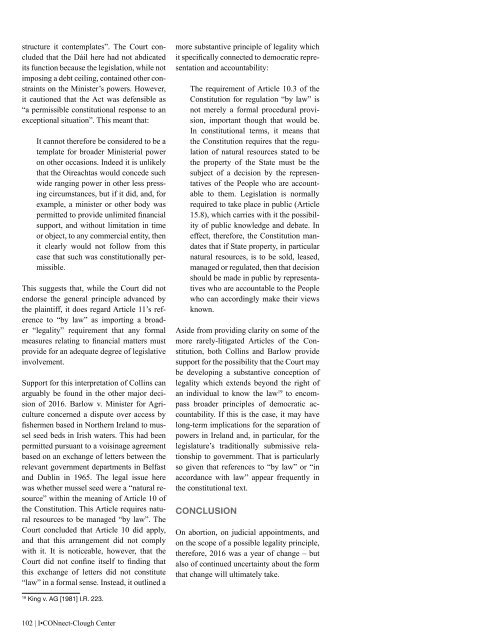2016 Global Review of Constitutional Law
I-CONnect–Clough Center collaboration.
I-CONnect–Clough Center collaboration.
You also want an ePaper? Increase the reach of your titles
YUMPU automatically turns print PDFs into web optimized ePapers that Google loves.
structure it contemplates”. The Court concluded<br />
that the Dáil here had not abdicated<br />
its function because the legislation, while not<br />
imposing a debt ceiling, contained other constraints<br />
on the Minister’s powers. However,<br />
it cautioned that the Act was defensible as<br />
“a permissible constitutional response to an<br />
exceptional situation”. This meant that:<br />
It cannot therefore be considered to be a<br />
template for broader Ministerial power<br />
on other occasions. Indeed it is unlikely<br />
that the Oireachtas would concede such<br />
wide ranging power in other less pressing<br />
circumstances, but if it did, and, for<br />
example, a minister or other body was<br />
permitted to provide unlimited financial<br />
support, and without limitation in time<br />
or object, to any commercial entity, then<br />
it clearly would not follow from this<br />
case that such was constitutionally permissible.<br />
This suggests that, while the Court did not<br />
endorse the general principle advanced by<br />
the plaintiff, it does regard Article 11’s reference<br />
to “by law” as importing a broader<br />
“legality” requirement that any formal<br />
measures relating to financial matters must<br />
provide for an adequate degree <strong>of</strong> legislative<br />
involvement.<br />
Support for this interpretation <strong>of</strong> Collins can<br />
arguably be found in the other major decision<br />
<strong>of</strong> <strong>2016</strong>. Barlow v. Minister for Agriculture<br />
concerned a dispute over access by<br />
fishermen based in Northern Ireland to mussel<br />
seed beds in Irish waters. This had been<br />
permitted pursuant to a voisinage agreement<br />
based on an exchange <strong>of</strong> letters between the<br />
relevant government departments in Belfast<br />
and Dublin in 1965. The legal issue here<br />
was whether mussel seed were a “natural resource”<br />
within the meaning <strong>of</strong> Article 10 <strong>of</strong><br />
the Constitution. This Article requires natural<br />
resources to be managed “by law”. The<br />
Court concluded that Article 10 did apply,<br />
and that this arrangement did not comply<br />
with it. It is noticeable, however, that the<br />
Court did not confine itself to finding that<br />
this exchange <strong>of</strong> letters did not constitute<br />
“law” in a formal sense. Instead, it outlined a<br />
more substantive principle <strong>of</strong> legality which<br />
it specifically connected to democratic representation<br />
and accountability:<br />
The requirement <strong>of</strong> Article 10.3 <strong>of</strong> the<br />
Constitution for regulation “by law” is<br />
not merely a formal procedural provision,<br />
important though that would be.<br />
In constitutional terms, it means that<br />
the Constitution requires that the regulation<br />
<strong>of</strong> natural resources stated to be<br />
the property <strong>of</strong> the State must be the<br />
subject <strong>of</strong> a decision by the representatives<br />
<strong>of</strong> the People who are accountable<br />
to them. Legislation is normally<br />
required to take place in public (Article<br />
15.8), which carries with it the possibility<br />
<strong>of</strong> public knowledge and debate. In<br />
effect, therefore, the Constitution mandates<br />
that if State property, in particular<br />
natural resources, is to be sold, leased,<br />
managed or regulated, then that decision<br />
should be made in public by representatives<br />
who are accountable to the People<br />
who can accordingly make their views<br />
known.<br />
Aside from providing clarity on some <strong>of</strong> the<br />
more rarely-litigated Articles <strong>of</strong> the Constitution,<br />
both Collins and Barlow provide<br />
support for the possibility that the Court may<br />
be developing a substantive conception <strong>of</strong><br />
legality which extends beyond the right <strong>of</strong><br />
an individual to know the law 19 to encompass<br />
broader principles <strong>of</strong> democratic accountability.<br />
If this is the case, it may have<br />
long-term implications for the separation <strong>of</strong><br />
powers in Ireland and, in particular, for the<br />
legislature’s traditionally submissive relationship<br />
to government. That is particularly<br />
so given that references to “by law” or “in<br />
accordance with law” appear frequently in<br />
the constitutional text.<br />
CONCLUSION<br />
On abortion, on judicial appointments, and<br />
on the scope <strong>of</strong> a possible legality principle,<br />
therefore, <strong>2016</strong> was a year <strong>of</strong> change – but<br />
also <strong>of</strong> continued uncertainty about the form<br />
that change will ultimately take.<br />
19<br />
King v. AG [1981] I.R. 223.<br />
102 | I•CONnect-Clough Center


